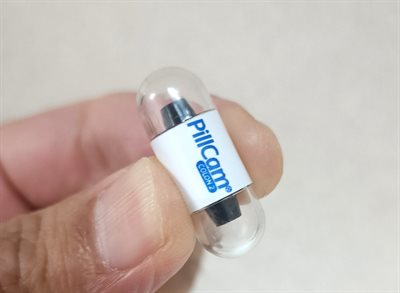Tiny pill camera to help diagnose cancer and may help reduce waits at NGH

The capsule camera is small enough to swallow
Northampton General Hospital (NGH) has introduced a new procedure to help diagnose bowel problems where a patient swallows a tiny pill-sized capsule containing a video camera.
It is also taking part in research to see if this kind of procedure – called a colon capsule endoscopy – can be used to help in the diagnoses of patients who have an intermediate risk of bowel cancer.
This could have the potential for reducing waiting lists for investigations which have built up during the COVID-19 pandemic.
Mr Kamran Malik, a consultant colorectal surgeon at NGH, said: “Essentially the capsule camera travels down into the intestines – filming all the way – and can help detect bleeding, bowel cancer and help diagnose other inflammatory conditions like Crohn’s disease.
“We use the photographs and footage taken by the capsule to determine things like whether a part of bowel is inflamed or whether it has a growth in it of any kind. This helps us to be more effective and targeted in our treatments which can range from using medication to surgery.”
The hospital is also taking part into important research into the effectiveness of capsule endoscopy and how it may help the NHS to speed up diagnoses without the need for more complex procedures such as normal colonoscopies.
So far 70 patients at NGH have consented to be part of a national study - Co-ordinated by York Teaching Hospital NHS Foundation Trust - out of the 73 patients who have had capsule endoscopies.
Mr Malik said: “The results of this research will help us to assess how good capsule endoscopy is at diagnosing bowel cancer and whether this test can be used in patients deemed at intermediate risk on routine bowel stool sample ‘FIT’ testing. If the research is successful it could mean more colon capsule endoscopies being carried out across the NHS - ultimately reducing pressure on NHS colonoscopy waiting lists. “
At the moment the Trust is able to offer colon capsule endoscopy to about six patients a week and in most cases it avoids the need for them to have a colonoscopy – a more invasive procedure.
Mr Malik said: “We are now looking to expand the service and hope patients and GPs across the county will become more aware of it.”
Patient case study
Retired school teacher Linda Gilbert, 74, from Hollowell, had a colon capsule endoscopy at NGH the end of last year and is also supporting the research programme.
She said: “I had tests and they had shown a very small amount of blood in my stool. Originally I was going to have a full colonoscopy but then the hospital contacted me and discussed the capsule endoscope alternative.
“I agreed and it was a quite quick and easy process. You swallow the capsule and wear a monitoring belt for a number of hours until you pass the capsule. Mine took about four hours and the nurse keeps in touch with you and checks you are OK during that time.
“Within a few days I got the results and a diagnosis of diverticulitis – a quite common problem. It was a great relief that it wasn’t cancer. I think this is an important new way of doing these tests and is very simple and straightforward and nothing to worry about.”
Capsule endoscopy has been used in the NHS for a number of years but this it is the first time the procedure, and associated research, has been delivered from Northampton General Hospital.
The Trust is also now performing the test in patients who are on surveillance after having had a previous polyp removal from their bowel. Usually these patents are booked for a one or three year surveillance colonoscopy but now can be offered Colon Capsule Endoscopy. If a polyp is detected they can then undergo a therapeutic endoscopy to remove it.
Posted on Tuesday 15th February 2022